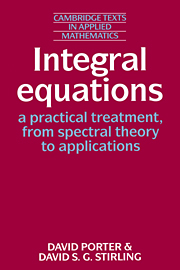Book contents
- Frontmatter
- Contents
- Preface
- 1 Classification and examples of integral equations
- 2 Second order ordinary differential equations and integral equations
- 3 Integral equations of the second kind
- 4 Compact operators
- 5 The spectrum of a compact self-adjoint operator
- 6 Positive operators
- 7 Approximation methods for eigenvalues and eigenvectors of self-adjoint operators
- 8 Approximation methods for inhomogeneous integral equations
- 9 Some singular integral equations
- Appendix A Functional analysis
- Appendix B Measure theory and integration
- Appendix C Miscellaneous results
- Notation Index
- Index
Appendix B - Measure theory and integration
Published online by Cambridge University Press: 05 June 2012
- Frontmatter
- Contents
- Preface
- 1 Classification and examples of integral equations
- 2 Second order ordinary differential equations and integral equations
- 3 Integral equations of the second kind
- 4 Compact operators
- 5 The spectrum of a compact self-adjoint operator
- 6 Positive operators
- 7 Approximation methods for eigenvalues and eigenvectors of self-adjoint operators
- 8 Approximation methods for inhomogeneous integral equations
- 9 Some singular integral equations
- Appendix A Functional analysis
- Appendix B Measure theory and integration
- Appendix C Miscellaneous results
- Notation Index
- Index
Summary
Measure theory and (Lebesgue) integration are both very detailed and technical topics, to an extent that can be off-putting to anyone seeking results to use elsewhere. In this appendix we have attempted to suppress detail that is not required for the purposes in hand - for example, we do not need to know the definition of a measurable function, only enough to show that the functions we shall encounter are measurable. We have not stated the results in their greatest generality.
We shall need to use a vector space of functions which forms a Hilbert space and the natural choice of norm associated with this is given by ∥ φ ∥ = {∫|φ(t)|2dt}½. This definition does indeed define a norm on the set of continuous functions on [a, b] but the resulting space is not complete and we need to enlarge our class of functions, which in turn requires a suitable integral, the Lebesgue integral.
A necessary condition for a function φ: S → ℝ (where S is, for the moment, considered to be an interval, possibly of infinite length, in ℝ) to be Lebesgue integrable is that it be measurable. The definition of measurability need not concern us here; what we do need to know is that all continuous functions, monotonic functions and all step functions are measurable and that the modulus of a measurable function, the sum and product of two measurable functions and a real-valued function which is the pointwise limit of a sequence of measurable functions are all measurable.
- Type
- Chapter
- Information
- Publisher: Cambridge University PressPrint publication year: 1990



